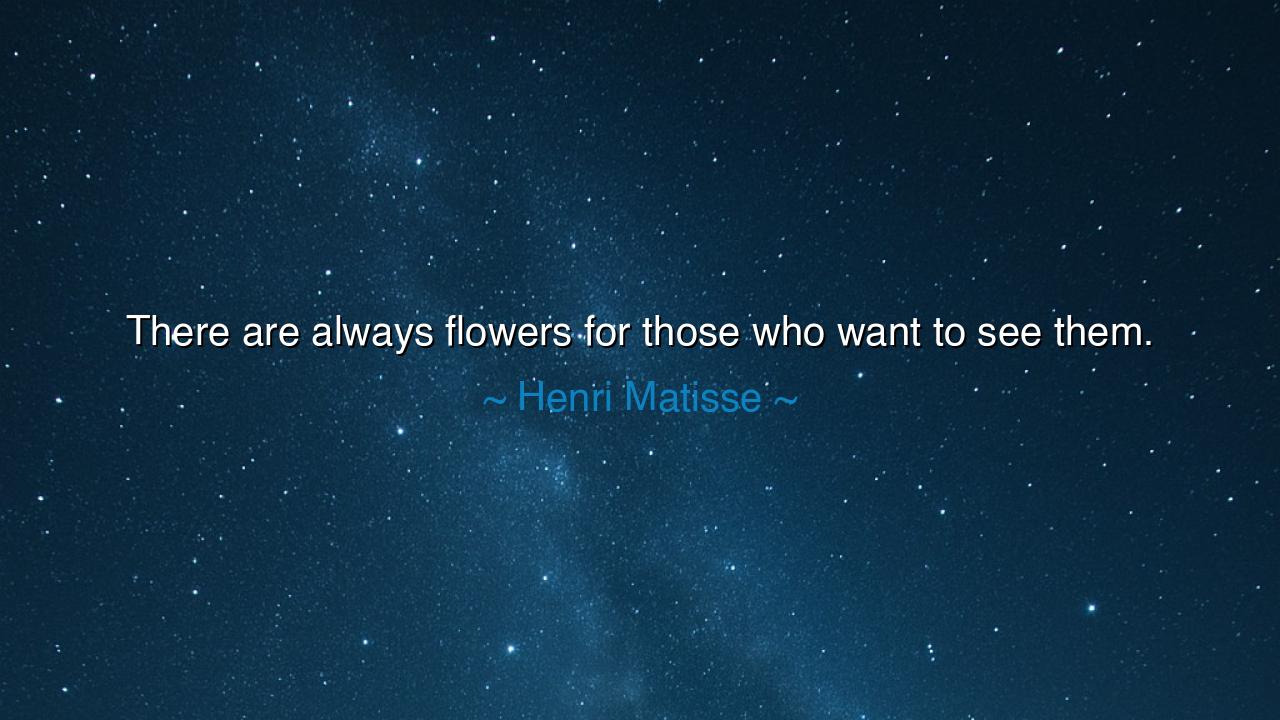
There are always flowers for those who want to see them.






Hear the gentle yet profound words of Henri Matisse, the painter of light and joy, who declared: “There are always flowers for those who want to see them.” This is not only the voice of an artist but the voice of a sage, for Matisse teaches that beauty is never absent from the world—it is only our eyes that are blind. The flowers of life may be hidden in hardship, veiled by sorrow, overlooked in haste, yet they are always present for the soul that chooses to look with wonder.
The flowers here are not merely blossoms in a garden, but symbols of hope, beauty, and meaning. One man sees only the thorns of existence, while another, standing in the same field, sees the roses in bloom. The difference lies not in the field but in the vision. So too in life: the world holds both pain and beauty, both despair and delight. Matisse, who himself painted through years of illness and limitation, reminds us that to live well is to choose to see the flowers, even when shadows are long.
The ancients knew this truth. The Stoics taught that happiness depends not on the events of life, but on the way we interpret them. Marcus Aurelius, emperor and philosopher, wrote in his meditations that even in hardship one may find goodness if one chooses to look rightly. His was a garden filled not with ease, but with flowers of perspective. Likewise, the Buddha taught that suffering is real, but so too is the beauty of compassion, mindfulness, and the joy found in simple being. These teachings are the soil from which Matisse’s words blossom.
Consider the story of Viktor Frankl, who endured the horrors of a concentration camp. Surrounded by death and cruelty, he found in the smallest things a reason to live: the memory of his wife’s smile, the beauty of a sunrise glimpsed through barbed wire, the kindness of a fellow prisoner who shared a crust of bread. In the midst of the most barren soil, Frankl chose to see flowers, and this choice gave him strength. His testimony proves Matisse’s wisdom: the eyes of the soul can discover beauty even in a place that seems stripped of all hope.
The meaning of Matisse’s words is not naïve, nor is it a denial of suffering. Rather, it is the heroic act of perception. To see flowers is to declare that beauty exists, even when the world whispers otherwise. It is to resist despair, to open the eyes of gratitude, and to find life’s treasures where others see only emptiness. The flowers are there for those who will bend low, look closely, and choose to notice them.
The lesson is clear: life gives to each of us both weeds and flowers. If you fix your gaze only on the weeds, you will live in bitterness; if you seek the flowers, your heart will be nourished by beauty. This is no trick of imagination but a discipline of the spirit. To see the flowers is to live with a heart tuned to hope, to choose gratitude over complaint, to embrace the eternal truth that beauty is always present for those who seek it.
What, then, are the practical actions? Each day, look intentionally for beauty: in the smile of a stranger, in the play of light upon the wall, in the fragrance of a meal shared with loved ones. Write down these flowers, so your memory may water them. In times of sorrow, remind yourself to look again, for even then the blossoms are there—perhaps smaller, perhaps hidden, but waiting for eyes that long to see. Train yourself to notice, and your life will be filled not with barrenness, but with gardens.
Thus the words of Henri Matisse endure as a quiet song of wisdom: “There are always flowers for those who want to see them.” Carry this teaching with you, O seeker. In every season, in every place, whether in joy or in sorrow, look for the flowers. For the eyes that choose to see beauty will never walk in darkness, but will live in a garden of light.






AAdministratorAdministrator
Welcome, honored guests. Please leave a comment, we will respond soon